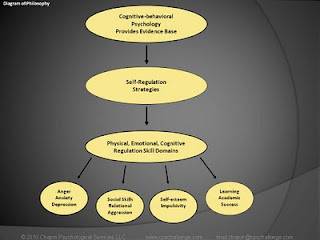Showing posts with label child behavior problems. Show all posts
Showing posts with label child behavior problems. Show all posts
Sunday, January 8, 2012
Self-regulation Training Book Now Available!
After several requests, we are proud to announce that the Self-regulation Training information is now available in a workbook.
"Helping Young People Learn Self-regulation" is now available through Youthlight Publishing. Self-regulation includes a universal set of skills necessary for academic success, emotional control and healthy social interaction. With this single resource you will be able to address children's anger problems, academic performance challenges, anxieties, school safety issues, self-esteem, social skills and much more.
As the term “self-regulation” suggests, this approach focuses on teaching children how to regulate their own emotions and behaviors. The authors have split the self-regulation training process into three functional area: physical, emotional, and cognitive. Using strategies based soundly upon the evidence base of cognitive-behavioral psychology, this resource will help you move children progressively through skill areas in each of these three domains.
Please contact author/trainer Brad Chapin, LCP, LMLP for more information about conducting a training in your area.
Brad.chapin@cpschallenge.com
Thursday, December 8, 2011
Give the Gift of Self-regulation to a Child this Season
Teaching your children to regulate their own emotions is a gift that will stay with them throughout their lives and help them reach their goals. We all run into difficult situations, even during the holidays. These situations are perfect opportunities to model for our children how to handle stress.
Hopefully you will have some extra time to spend with your children this holiday season. Here are a few simple things you can do to improve your child's self-regulation:
Brad Chapin, LCP, LMLP
brad.chapin@cpschallenge.com
Hopefully you will have some extra time to spend with your children this holiday season. Here are a few simple things you can do to improve your child's self-regulation:
- Take a little extra time to spend one-on-one with your children. It's easier to hear what they have to say and to communicate what you would like for them to hear from you when there are just two of you.
- Tell stories of your family traditions and how they came to be. Family traditions provide a child with a strong sense of identity and connectedness that serve as the foundation for healthy self-control.
- Communicate the need to be thankful for what they have, and the importance of helping others. The holiday season provides opportunities to give back to those who may be less fortunate.
- Try and remember to "guide" children to come to a healthy conclusion when they struggle with social/emotional issues. We are often too busy, or have a strong desire to "fix" things quickly. Helping children learn to problem-solve on their own is a skill that will help them to be more successful no matter what challenges they may face.
- in social relationships
- in school with better grades
- in self-care and physical health
- in sports
- at achieving their goals
- in life in general
Brad Chapin, LCP, LMLP
brad.chapin@cpschallenge.com
Sunday, September 4, 2011
Computer-assisted Counseling Resources for Children
 Children are spending the majority of their waking hours interacting with technology. Why aren't we aggressively tapping into this time and using their interest to teach them useful skills?
Children are spending the majority of their waking hours interacting with technology. Why aren't we aggressively tapping into this time and using their interest to teach them useful skills?To engage today's youth, we adults must be aware of the youth culture. What do you think a child would do if you gave them the option to learn something in a workbook, or learn it while interacting with a computer?
Resources that involve videos and interactive games engage children on "their turf." They feel less threatened because the technology is familiar to them. Their defenses are often lower when watching, or interacting, with characters in a computer program because it's less direct. They are able to relate to the situations and characters, but it's much less intimidating than a direct line of questioning.
We have been noting the benefits of computer-assisted counseling techniques for several years while developing the Challenge Software Program for children (a program that uses video scenarios and games to teach children the basics of self-regulation). From our experience, there is really no comparison between the engagement of children when it comes to computer-assisted counseling techniques and traditional interventions. If you don't believe it, ask a child. Or better yet, try it for yourself:)
Brad Chapin, LCP, LMLP
brad.chapin@cpschallenge.com
Sunday, December 12, 2010
Outcomes & Evidence-based Interventions are on Everyone's Mind
 For or better or worse, the days of selecting interventions that we "feel" are going to work are over.
For or better or worse, the days of selecting interventions that we "feel" are going to work are over.Having a solid framework has never been more important. Our framework for working with children needs to be soundly based on outcomes and research. In addition to these pressures, are the ever-increasing demands to do More in Less time and with Less resources.
I believe that is why so many of us have migrated toward the use of Cognitive-behavioral psychology. I also believe that these pressures have forced us to address "global" themes of behaviors (like self-regulation) that can affect many areas of functioning to maximize the effectiveness of our interventions.
The model in the picture above is soundly based on Cognitive-behavioral psychology and encourages addressing Self-regulation to maximize results in several areas. This practical framework provides an Evidence-based approach, but still allows for creativity in the selection of specific interventions that are consistent with the philosophy.
Improving Self-regulation can impact a broad variety of issues including:
- Academic Success
- ADHD symptoms
- Behavioral issues
- Mood problems
- Self-esteem
- Social Skills
This list is not complete, but it's an indication of how targeting Self-regulation and training children how to better regulate themselves can impact their level of functioning in many areas.
The Challenge Software Program utilizes technology and animated scenarios to engage children quickly and teach them the basics of Self-regulation.
by Brad Chapin LCP, LMLP
email: brad.chapin@cpschallenge.com
Subscribe to:
Posts (Atom)
